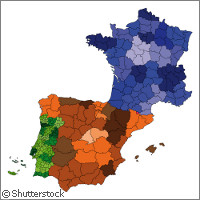European consortium seeks drugs to prevent diabetes and obesity
A new European consortium is searching for new compounds to prevent diabetes and obesity. DIOMED ('Diabetes, obesity and medicine'), which kicks off on 22 May, will run for 3 years and has been funded with EUR 813,673 by the EU's Territorial Cooperation Programme for south-west Europe (Interreg IV-SUDOE), which supports transnational and interregional innovation projects. The consortium, coordinated by Antonio Zorzano of the Institute for Research in Biomedicine (IRB) in Barcelona, Spain, brings together experts in biology, chemistry, protein structure, nano-screening technologies and technology transfer from six centres in Spain, France and Portugal. 'The project has a clear objective to generate value by producing pre-drug compounds that can be patented for the treatment of diabetes and obesity,' explained Dr Zorzano. 'Later on, if these compounds are effective in diabetic animals, they will be tested in clinical trials.' The research will focus on finding molecules that have an effect on three target proteins (called Mitofusin-2, DOR and VAT), which were previously found to be associated with diabetes and obesity by scientists at IRB and at INSERM (Institut National de la Santé et de la Recherche Médicale) in France. One of the consortium's four research teams, working at the University Santiago de Compostela in Spain, will use high-throughput screening to analyse a chemical library of more than 1,200 molecules, using combinatorial chemistry techniques to improve the effectiveness of promising compounds. Following success in these areas, the results will be tested in animal models by researchers at the IRB, who specialise in gene identification and analysis of molecular mechanisms. In parallel to the search of chemical libraries, other researchers in the consortium will obtain structural information about the target proteins. Having acquired the 3-D information by X-ray crystallography, computational systems will be applied to look for molecules that fit the structure. One of the objectives of DIOMED is to promote biomedicine in south-western Europe. Accordingly, both innovation and technology transfer to the biotech sector are important to the success of the project. 'DIOMED seeks to return to society the benefits of biomedical scientific and technological capacity in south-west Europe,' said Dr Zorzano. The project also hopes 'to achieve scientific breakthroughs that can lead to an improvement in quality of life and can contribute to the socioeconomic growth of the regions through the development of biotech products'. In addition to the IRB and INSERM, DIOMED partners include the Barcelona Science Park and the University of Santiago de Compostela in Spain, as well as the Institute of Molecular and Cell Biology of the University of Porto and Biocant Park in Portugal. Interreg IV-SUDOE is a continuation of Interreg III-SUDOE, which is co-financed by EU Structural Funds for the period 2007 to 2013. The Interreg programmes foster transnational, cross-border and interregional innovation and competitiveness initiatives.
Countries
Spain, France, Portugal



